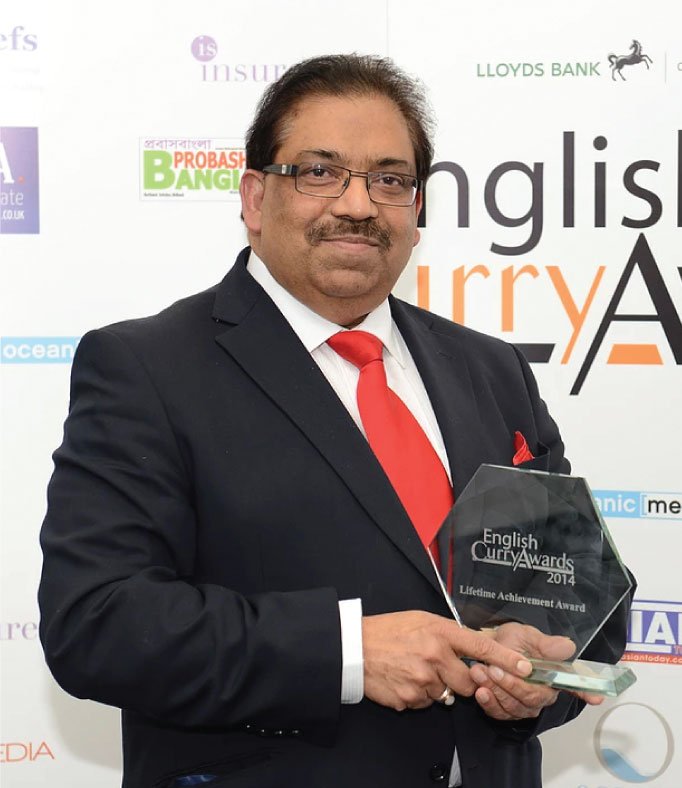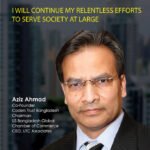Ahmed us Samad Chowdhury
FISMM, FCMI, FIH
Justice of Peace
hmed us Samad Chowdhury, a serial entrepreneur, philanthropist and media personality, continues to spend more time to bridging the gap between communities. He is the President of the City of Bath College of Further Education and Founder Director and Advisor of the British-Bangladesh Chamber of Commerce and Industry.
Since coming to Britain in 1972 from Bangladesh, Ahmed has been working tirelessly to raise the profile of the British-Bangladesh community and improve racial integration for the benefit of increasing prosperity and wellbeing. As one of the first to introduce authentic Indian cuisine to the West, he played a key role in changing British dining habits and helping to popularise the British curry as a unique dish, now more popular in the UK than fish and chips. Following the success of his award-winning restaurants in Bath and Bristol, he has built a business empire encompassing newspapers, the leading Bangladeshi TV station-Channel S, property and knitwear.
Ahmed has been named as the most influential media person and is included prominently on the British-Bangladeshi Power and Inspiration 100 each year since its inception. He continues to also feature regularly in British Bangladeshi Who’s Who and many other prestigious spublications.
Background & Achievements
Early Years
Born in the Sylhet region of Bangladesh, Ahmed came to Britain in 1972 to pursue higher education. After gaining business management qualifications, he decided to launch his own business. Taking a loan of just £250, he set up the West Country’s first Indian take-away in Bristol in 1979 before opening the award-winning Rajpoot Restaurant in Bath in 1980. Rajpoot was the lead restaurant that raised the standard of Indian cuisine in the UK. As well as winning numerous awards for fine dining, it is regularly named among the top ten Indian restaurants in the country.
Diversification
Since the mid-1990s, Ahmed has diversified into media enterprises, knitwear and property development. In 1997, he launched the first colour broadsheet newspaper for the British-Bengali community called Potrika. It is now a vibrant popular newspaper and has made a huge contribution in educating readers about the British way of life.
In early 2000, he became the Chairman of Channel S which is the most viewed Bengali channel in the UK. Later, he introduced an annual awards event in a number of different areas including education, business, culture and community work.
Integration
While Ahmed had the ambition and organisational skills to launch successful enterprises, he was aware that many Bangladeshis face great difficulties after arriving in Britain. With a view to supporting and helping them to become integrated, he set up several centres in the West Country.
In 1988, he founded the Bangladesh Women’s Group for Bristol, Bath and the West Country to help women so that they become more integrated into British society. In 1990, he set up Bangladesh House which is a centre to help the Bangladeshi community in the South-West of England that become integrated into the British way of life and get advices on important issues.
With personal donations and taking a loan on his personal assets, he founded the Bangladesh Centre in Bristol in 1993 and offered classes in English as a second language, training to help boost employment prospects, fitness classes and other activities.
Philanthropic Activities
The Community
Ahmed has put his talents to good use and donated tens of thousands of pounds and raised millions for good causes including the children’s ward at the Royal United Hospital in Bath, Barnardos, Macmillan Cancer Relief, Action for Kids and local schools in Bath also in major relief and charitable projects in Bangladesh.
In addition, Ahmed founded a branch of an organisation called the Immigration Advisory Service in Sylhet Bangladesh to give people official guidance about immigration to the UK. One of his biggest community projects in the UK was the construction of Shahjalal Jame Mosque in Bristol in 1998 at a cost of £1.2 million.

An International Stage
With a view to facilitating better international relations, he founded the British-Bangladesh Chamber of Commerce in 1991 and also chaired the British-Bangladesh Friendship Society for eight years.
He also played a leading role in raising standards as a member of the National Steering Committee of the Hospitality Training Foundation which worked on making National Vocational Qualifications and Scottish Vocational Qualifications more accessible to the Asian caterers and restaurant industry.
In Bangladesh, Ahmed has heavily involved in numerous philanthropic projects establishing schools, orphanages, hospitals, cyclone shelters and contributing to libraries.
Continuity
In his role as a businessman, community leader and magistrate since 1991, he follows all matters of public interest very closely. Moreover, he has extensive experience in a wide range of areas of interest including education, the economy, employment, international relations, culture, hospitality, criminal justice as well as a general interest in health and wellbeing.
Indeed, as recognition of his achievements and as proof of his standing for the community, many complimentary profiles have been written in newspaper and journals including the Western Daily Press, Daily Mail, The Guardian, the Bath Chronicle, Bath Life magazine, Venue magazine as well as many leading publications in Bangladesh.
Catering Circle Chief Advisor
Catering Circle is a media platform for the catering industry to identify problems, discuss and address the issues, and formulate solutions through active participation of caterers and other key stakeholders.
Fenchuganj Education Trust UK
Founder
The objective of this trust is to help the people to integrate and educate the local community- especially women– with the prospect of better life opportunities in the UK. An additional objective is to establish a vocational training institute for the disadvantaged in Fenchuganj, in order to provide skills so they can obtain jobs and ultimately to make them self-sufficient. He believes, if we go forward in abroad with dignity, we have to work together.
Channel S Television Chairman
Channel S is a UK-based free-to-air television channel targeting the British-Bangladeshi community. Channel S was the first Bangladeshi channel to broadcast content in the Sylheti dialect in the UK, and serves to represent and work for the British-Bangladeshi community.



